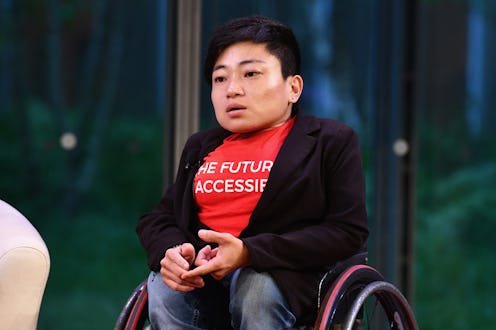News
The Medicare For All Convo Must Include Disabled People, Because It’s Life Or Death For Us

In this op-ed, Mia Ives-Rublee, a disabled organizer who serves as the Women's March disability coordinator, explains why politicians who are pushing Medicare for All proposals need to make sure they're centering voices from the disabled community.
"Medicare for All" has become the new buzzy slogan for progressives in 2019, and everyday Americans have latched onto the movement. Yet as the conversation around Medicare for All rages on, there are key voices missing: those of poor and disabled people.
According to a 2018 Reuters/IPSOS poll, 70 percent of Americans support a Medicare for All policy. But any bill passed out of Congress should enact truly inclusive, affordable health care that will lead to universal coverage and is accessible, appropriate for, and inclusive of disabled women. In order to achieve that, politicians must work intensively with the disability community to include our voices in the conversation, ensuring that Medicare for All is truly for all.
Here’s why this matters: Previous proposals for a Medicare for All policy, like the one put forward by Sen. Bernie Sanders (I-VT), have proposed getting rid of most of Medicaid, a program that 75 million poor and disabled people rely on to obtain the services they need for little or no cost. Many services covered under Medicaid — like community-based long term support services (LTSS) that help keep disabled people in their homes — aren’t covered under Medicare.
Medicare for America, another plan proposed by Reps. Rosa DeLauro (D-CT) and Jan Schakowsky (D-IL), would cover community-based LTSS under Medicare. However, that plan is not a true universal single-payer plan, because it allows individuals to opt out of the system if they are on another health care plan.
Now, Rep. Pramila Jayapal (D-WA) has released a plan that is one of the most comprehensive proposals to make its way around Congress. The plan, which was introduced Wednesday, includes provisions that would greatly expand coverage to include dental, vision, prescription drugs, reproductive health services for women, maternity and newborn care. It would also cover LTSS and include plans for folks of all ages. It's a big step in the right direction.
Repeatedly, the disability community has asked to be included in discussions that affect us.
If lawmakers were to accept a version of Medicare for All that doesn't cover community-based LTSS, disabled people will either be forced to buy supplemental coverage or be forced to remain on Medicaid. Disabled people — whose employment rates were at just 19.1 percent in 2018, according to the Bureau of Labor Statistics, and who make on average 63 cents for every dollar non-disabled people make, according to the American Institutes for Research — can hardly afford to pay for additional coverage. Leaving poor and disabled people to rely on a separate system like Medicaid will likely result in even poorer outcomes. Continued conservative attacks have resulted in gutting Medicaid services through block granting, work requirements, and drug testing.
Many disabled people and people with chronic illnesses remain skeptical of how politicians will address the issues around Medicare for All. Disabled people tend to get left out of the decision-making process with many progressive policies, including those around public transportation, plastic use, and gun violence prevention.
Repeatedly, the disability community has asked to be included in discussions that affect us, but policymakers and non-disabled advocates have offered tepid support at best, often leaving disabled people out of the debate when they're not needed as poster children.
The pursuit of a true Medicare for All program is an exciting prospect, one that could bring real change to the lives of so many. I, too, support a universal health care program. The Women’s March Women's Agenda lays out a plan for creating a universal Medicare for All system that is focused on our most vulnerable communities, including the disability community.
Disabled people and poor people should not be bundled into a separate Medicaid plan or be required to purchase supplemental coverage in order to receive the health care they need. Progressive politicians are moving rapidly to ride the change in public will on this issue, but they must pay attention to the finer details. They will need stakeholders' knowledge to ensure the same issues that plague Medicare and Medicaid don’t replicate themselves in their bold single-payer proposals. It could mean life or death for me and other members of the disability community.